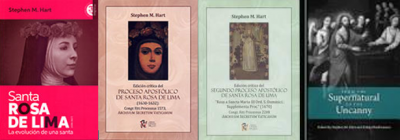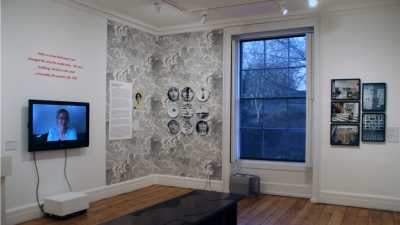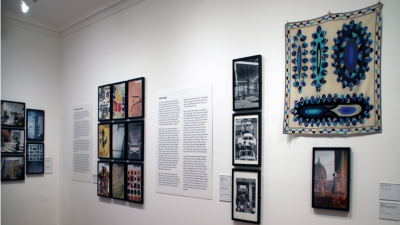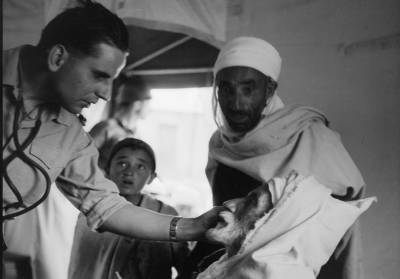- Digital Critical Edition of Middle-Period Works by Arthur Schnitzler (1862-1931)
AHRC Funded Project
Dr Judith Beniston (UCL, Co-I), Professor Andrew Webber (Cambridge, PI), Professor Robert Vilain (Bristol, Co-I), Dr Annja Neumann (Cambridge, research associate. Two PhD scholarships (one at UCL and one at Bristol) from October 2014.
Arthur Schnitzler is one of the leading figures in European and German-language Modernism, and unique for a writer of his stature in not having a critical edition devoted to him. Schnitzler's papers were saved from likely confiscation and destruction in Vienna in 1938 and brought to Cambridge, where the larger part of them is now held in the University Library. The archive includes early versions of many published works, and the aim is to make this rich and fascinating resource available to a wide range of users. In the course of this five-year project, scheduled to run January 2014-December 2018, the UK team will produce digital editions of a set of works from Schnitzler's middle period, transcribing manuscript material and developing an extensive critical apparatus. The corpus comprises the novel Der Weg ins Freie, the plays Professor Bernhardi and Das weite Land, and a set of less well-known puppet plays. The edition will be hosted on the website of Cambridge University Library. Alongside open access to the edited works and their apparatus, the findings of the project will be presented through international conferences and workshops, theatre productions and other events, and through publications in book and journal form.
- Medical (In)humanities
UCL Grand Challenges
Dr Stephanie Bird, Dr Mark Hewitson and M. Zusi (UCL SSEES)
A multidisciplinary project exploring how medical practice and theory, and its representation, has undermined or consolidated notions of humane behaviour. Key areas include history, human rights, ethics, empathy, discourses of sovereignty, and political theory.
The title ‘Medical (in)humanities’ is a provocative response to the field of medical humanities and is designed to explore the assumptions underlying the very notion of ‘inhumanity’ in order to define what is humane. The concept of ‘inhumanity’ can already elicit objections on philosophical and ethical grounds, just as the naïve postulation of what is ‘humane’ itself reinforces particular constructions of the human and its Other.
The term ‘medical humanity’ readily aligns medical discourses with moral value and notions of the Good, but leaves open the question of whose ‘good’ is at stake. Thus ideas of the bio-political point to the modern state’s claims to control over its citizens – through medicine and medical discourse – as population and as body, whether in the Nazi camps or in the use of torture in the fight against terrorism.
The ideal of ‘the good of the patient’ is inseparable from wider discourses that may directly undermine it, such as the aspirations for the universal healthy body, healthy race or healthy use of social resources. Indeed, as psychoanalytic discourse suggests, what is deemed humane always comes at a high price.
Central to the notion of medical (in)humanity is the role that empathy plays in the definitions of personhood, usually equated with human personhood. The importance of science to the understanding of the body, medicine and diagnosis has frequently displaced the role of empathy in healing.
The objectification of the body as a complex mechanism, pervasive now in the growing trend to reduce the understanding of affect through neuroscience, often runs contrary to concerns in the humanities with understanding the subject’s relation to the other through empathy. This tension is also manifested within clinical practices that are medical and those that insist upon the value of therapeutic interaction to address traumatic symptoms.
The aim of the project is to open up what is already an inter-disciplinary venture to further avenues. Key areas of exploration will be political theory, history, discourses of sovereignty and subjectivity, human rights and security, trauma and empathy, ethics and medical ethics, and the interplay of medicine and culture.
Current researchers are drawn from a variety of disciplinary backgrounds: history, cultural criticism, political theory, socio-linguistics, psychiatry, psychoanalysis and psychology. The project is being supported by a grant from the UCL Grand Challenges: Human Wellbeing. For further information please contact one of the project co-ordinators:
- Mark Hewitson: m.hewitson@ucl.ac.uk
- Peter Zusi: p.zusi@ucl.ac.uk
- Stephanie Bird: stephanie.bird@ucl.ac.uk
- Visit blog
- Medieval Francophone Literary Culture Outside France
AHRC Funded Project with King's College London and Cambridge
Two postdoctoral Research Associates are associated with the project, of whom one at UCL (Dr Dirk Schoenaers), the other at Cambridge University.
Dr Jane Gilbert, Co-Investigator
- The Violence of War: Images and Experiences of Conflict
AHRC Funded Project
The project comprises both individual research and collaboration between different institutions.
Dr Mark Hewitson
- Philemon Foundation Critical Edition of Unpublished Works of C. G. Jung
German edition with English translation, with further editions in other languages, founded in 2004. Since 2008, Princeton University Press and W. W. Norton have published 4 vols, with one in press and one in submission. Collaborating institutions include the Swiss Federal I of Technology, Zurich.
Professor Sonu Shamdasani and Dr Martin Liebscher
- Open Learning Environment Early Modern Low Countries History
UK Open Educational Resources initiative, led jointly by JISC and the Higher Education Academy
Ulrich Tiedau (Principal Investigator) with An Vanderhelst (Dutch, research fellow)
- Sustainable Texts and Disciplinary Conversations
UK Open Educational Resources initiative, led jointly by JISC and the Higher Education Academy
Ulrich Tiedau (Principal Investigator) with J. Hughes and C. McKenna (CALT)
- Reading & Reception seminars
As part of a collaboration with the UCL Arts & Humanities, the Reception of British Authors in Europe (RBAE) and the Institute of Modern Languages Research (IMLR) will be holding its programme of Reading & Reception seminars at UCL.
The RBAE is a research project dedicated to exploring the reception of British and Irish authors in Europe, and intercultural dynamics involved.
These informal seminars consider both critical approaches (all varieties of reader-response theory and critical reception in books, periodicals and the work of other authors) and material approaches (history-of-the-book topics relating to publication, distribution and circulation).
Translation is a major concern, and historical, textual and theoretical case studies of all kinds are welcome. The seminar is also open to those working on European as well as non-European authors in Britain.
The Reading and Reception seminars attract academics nationally and internationally to speak on a wide range of topics related to inter-cultural reading. These have included encountering ‘savages’, the translation of WG Sebald, Dickens and Flaubert, inter-medial translation in response to Nooteboom, interpreting Oscar Wilde on stage, and German Modernism and vampirism.
The collaboration between the RBEA and UCL A&H also marks the foundation of a new strand of seminars exploring relations between science and literature. It will consider the interface between scientific and literary texts, the manner of their reception, and the possibilities of reading and critical response generated by these considerations.
- Luis Bunuel: A Life in Letters (Evans)
Luis Bunuel: A Life in Letters (Evans)
- St Rose of Lima (1586-1617): A History (Hart)
Stephen M. Hart is PI of the project "St Rose of Lima (1586-1617): A History" (2013-2021), funded by the Leverhulme Trust and the British Academy, which has curated a new understanding of St Rose of Lima, the Americas’ first saint. It was always believed that Rose was canonized because of the miracles that occurred in Peru, but we now know that only five of the chosen miracles were Peruvian – the other four miracles occurred in 1669 in Sessa Aurunca in southern Italy and in Palermo, Sicily! Secondly, it was always assumed that the author of the official seventeenth-century biography of St Rose of Lima, published in Latin (Vita mirabilis et mors pretiosa venerabilis sororis Rosae de S. Maria… ) in 1664, was a German Dominican, Leonardus Hansen (i.e., the name that appears on the frontispiece), but this was a smokescreen to hide the true identity of the biographer: he was the Very Reverend F. Vincent Torre (1631-1687), the Provincial of the Dominicans in England, who was accused in the Houses of Parliament by Titus Oates on 31 October 1678 of being a Catholic conspirators behind the Popish Plot. By producing critical editions of St Rose’s First and Second Apostolic Processes, this project has created an empiric account of her life and revealed the tensions she experienced with her overbearing mother and her controlling confessors. For more information see Hart’s interview:
https://www.ucl.ac.uk/european-languages-culture/news/2019/jun/santa-rosa-de-lima-project
Hart is currently writing a new biography of St Rose of Lima in English for Tamesis books.

- Compromised Identities? Reflections on Perpetration and Complicity under Nazism (Fulbrook and Bird)
We readily think of ‘perpetrators’ as those directly involved in physical violence: giving the orders, pulling the trigger, killing innocent victims. But under Nazi rule, millions were involved in broader processes of persecution. How can we understand not only direct perpetrators, but also those who were complicit in systemic racism, as well as the passivity of ‘bystanders’?
‘Compromised Identities?’ explores how perpetration and complicity are represented and understood both at the time and later. It considers ways in which individuals and others tell their stories about being involved in state-sponsored violence, and how the stories change over time. Individuals and societies understand themselves and create identities through the narratives they tell. These narratives evolve under changing circumstances and through social interaction. People’s individual and collective identities, how they view and feel about themselves, may be compromised if they are involved in mass violence; they may feel that they have made moral compromises or not lived up to their ideals. But more commonly, individuals and societies try to maintain a ‘good’ version of themselves by justifying acts of violence or denying involvement.
With a recent rise in racist and antisemitic acts, continued instances of collective violence, and renewed calls for reckoning with violent pasts, these reflections remain all too relevant today.Compromised Identities Exhibition - https://compromised-identities.org/
- Interdisciplinary Italy (Mussgnug)
Since 2015, Professor Florian Mussgnug (UCL School of European Languages, Culture and Society) has been co-investigator for the large AHRC-funded research project, “Interdisciplinary Italy 1900-2020: Interart/Intermedia”, which was successful in two consecutive funding rounds, obtaining a five-year project grant in 2015 (£685,500.18) and, previously, a networking grant in 2012 (£31,1554.45). The project is jointly led by Musssgnug with Professor Clodagh Brook (Trinity College Dublin) and Professor Giuliana Pieri (Royal Holloway University London), with Dr Emanuela Patti (Senior Researcher). It explores the cultural impact of creative practice across different media, with a specific focus on literature, art, architecture, film, music and design. In 2017 and 2018, the project hosted a series of one-day workshops in London and Rome with leading researchers, museum curators, writers and visual artists. A two-day international conference, ‘Interart, Intermedia in Italy from the Medieval Age to the Present’, was hosted by Royal Holloway University in April 2019.
Key outputs include the project website (http://www.interdisciplinaryitaly.org) which hosts over 150 written contributions by creative artists and researchers, in the form of an outward-facing blog. The website has been viewed more than 25,000 times since 2015. A project exhibition at the Estorick Collection of Modern Italian Art, The Making of Modern Italy: Art and Design in the Early 1960s (January to April 2019) was curated by Pieri. During the most recent stage of the project, Brook, Mussgnug and Pieri have co-authored a multidisciplinary cultural history of modern Italy, Intermedia in Italy: From Futurism to Digital Convergence, which was recently submitted for publication to Legenda Press.

- Frantz Fanon: Gender, Torture and the Biopolitics of Colonialism (Haddour)
Professor Azzedine Haddour, University College London, Leverhulme Research Fellowship
In the 1845 Congrès médical, the Minister of Education commended military doctors for their contribution to France’s conquest of Algeria. Alphone Bertherand (head of the Medical School of Algiers) advocated a ‘medicine of propaganda’ operating at the forefront of civil-state administration, not only ensuring public hygiene but also acting as an ideological instrument of colonisation. France’s ‘great civilisational work’, he argued, was to assimilate the Algerians by gradually modifying their traditions.
Like medicine, radio technology was appropriated as an instrument of colonial propaganda. Radio technology also bequeathed French language the infamous ‘gégène’, short for ‘radio generator’, meaning the use of electricity in ‘questioning’. The wireless operated at the intersection of the public and private spheres to conquer the last rampart which thwarted the advances of colonialism: the Algerian culture emblematised by the Algerian woman. At the height of the Algerian War, General Massu and his wife spearheaded the propaganda campaign.
Medical and radio technologies were deployed to bolster French colonial policies of subjugation and assimilation, to sanitise torture and to conquer the Algerian domestic sphere. This project lays bare the interplay of colonial and gender politics, engaging with the instrumentalisation of these two technologies in the colonial process. Using recently declassified archival materials, Professor Azzedine Haddour considers Fanon’s neglected anti-colonial polemic 'A Dying Colonialism', exploring the complicity of medical and radio technologies as propaganda media and analysing the negative consequences which war, torture and colonial violence had on Algerian society and on France’s republican institutions.

- AI in Experimental Film from the German-speaking Context: Surveillance, Complicity, Vulnerability (Ring)
AI in Experimental Film from the German-speaking Context: Surveillance, Complicity, Vulnerability (Ring)
- Translating the Literatures of Small European Nations (Stougaard-Nielsen)
“Translating the Literatures of Small European Nations” was funded by the Arts and Humanities Research Council (AHRC) under its Translating Cultures theme, and ran from 2014 to 2017. The project team consisted of researchers in Czech and Slovak, Portuguese, Scandinavian and South Slav literatures from Bristol (Rajendra Chitnis), Cardiff (Rhian Atkin) and UCL (Jakob Stougaard-Nielsen and Zoran Milutinović). The aim of this project was to understand better the ways in which European literatures written in less well-known languages, which depend on translation to reach the wider world, try to break through to the cultural mainstream.
The Team published a Project Report, based on the findings from workshops and other interactions with professionals involved in the UK translation industry. A major outcome of the project was an anthology published by Liverpool University Press in 2020. Through case studies of over thirteen different national contexts as diverse as Bosnian, Catalan, Czech, Dutch, Maltese, Polish, Portuguese, Swedish and Serbian, it explores patterns and contrasts in approaches to supply-driven translation, cultural diplomacy, institutional support and international gate-keeping, while examining the particular fates of poetry, women’s writing and genre fiction, and the opportunities arising from trans-medial circulation, self-translation and translingualism and a more radical critique of power balances in the translation and publishing industries.
- A Sign of Contradiction: Religion and Revolution in the Work of León Ferrari (Niall H.D. Geraghty)


León Ferrari (1920-2013) first emerged as a politically committed artist through the creation of his work La civilización occidental y cristiana (1965) which, conceived as a protest against the Vietnam War, features Christ crucified on a US bomber. From this point onwards Ferrari’s artistic practice (incorporating painting, collage, sculpture, poetry, and printmaking) consistently blended art and politics, coupling a denunciation of structural and political violence (including the crimes of the last Argentine dictatorship) with a rigorous critique of the Catholic Church. In the following years, Ferrari would become one of the most important and provocative visual artists working in twentieth-century Argentina, and his artistic creations and polemical writings continued to provoke furious reactions from his detractors and robust responses from his advocates. Nonetheless, Ferrari’s critique of the Church was based on extensive theological and historical research and, for this reason, I propose that his artistic work, too, can be considered a profound source of theological experimentation.
Despite the condemnation of the institutional Church, then, I will uniquely argue that Ferrari’s work in fact constitutes ‘a sign of contradiction’ (Luke 2:34), a theological concept bestowed upon entities which despite (or due to) their inherent holiness precipitate severe resistance. Indeed, by bringing Ferrari into dialogue with contemporary liberation and queer theologians, it will be shown that his art radically challenges ecclesiastical authority and reconfigures theological conceptions of the body and sexuality, such that his artistic reflections on the atrocities of the recent past can contribute to the rejuvenation of Catholic thought in Latin America.
Niall H.D. Geraghty - Lecturer in Latin American Cultural Studies and Leverhulme Early Career Fellow
- Developing a Partnership Between Universities and Schools in Order to Enhance the Student Experience of the Spanish A-level’ (Hart)
Prof. Stephen Hart is the PI of the HEIF/UKRI-funded project, ‘Developing a Partnership Between Universities and Schools in Order to Enhance the Student Experience of the Spanish A-level’; 15 March 2021-14 March 2022: KEI2021-01-32; £14,833. This project is designed to improve the links and knowledge exchange between schools and universities in the field of Language Learning, and it is based on a partnership between University College London, the Instituto Cervantes, University College School, the University of Glasgow, Westminster School, Canford School and City of London School. Four Opinio surveys have been carried out (June-July 2021) and they suggest that the Spanish A-level curriculum should be expanded to include new topics such as ‘Science in Spanish’ and ‘Business Spanish’. Three webinars are programmed (14/10/2021; 3/11/2021; 1/12/2021) to discuss these proposals, an archive of relevant Spanish language and culture materials is being established, and a policy document relating to these recommendations is currently being worked on. Click here for further information.
- The New Spanish A-Level (video presentation)
- Modern Languages Challenges and Solutions (webinar recording 14-10-2021):
YouTube Widget Placeholderhttps://youtu.be/R_JA5CHwbfg - Women writers in the Brazilian daily newspaper O Paiz (1884-1934)
Project Title: É preciso falar sobre as ausentes: a colaboração feminina no jornal O Paiz (1884-1934)
The project aims to carry out an exhaustive survey of the collaboration of Maria Amália Vaz de Carvalho (1847-1921), Délia (1853-1895), Carmen Dolores (1852-1910) and Júlia Lopes de Almeida (1862-1934) in the newspaper O Paiz (1884-1934), available at Hemeroteca Digital Brasileira. The survey will recover more than five hundred texts aimed at the rising female readership of newspapers, inviting us to re-evaluate the presence of women in the mainstream press and their role as cultural mediators and opinion makers. The data is to be published in open-source digital editions, accompanied by studies of the collaborators’ personal and intellectual trajectories, textual analysis in terms of their themes, their relationship with the other newspaper columns and with the Brazilian socio-political context.
The aim is to highlight the social, cultural and intellectual roles occupied by women writers of this period. The choice for O Paiz is justified by its adopted political stances and the notable presence of female collaboration within the newspaper pages. The research intends to demonstrate the relevance of women’s writing in a newspaper which defended republican and abolitionist values, expressed by male columnists such as Joaquim Nabuco and Quintino Bocaiúva, and which aimed to achieve a wide and varied readership. Alongside these editions, we will submit four articles to reputable peer-reviewed journals and organize conferences to share the partial and final results of the project. The editions, with a modern orthography and critical notes, will address a notable lack in press history and Brazilian literary culture in regard to the history of the crônica, women’s writing and the foundation of a female intellectual field in the Brazilian Belle Époque. The location, publication and systematic examination of these texts represent a further step toward the construction of new narratives around women’s voices that have been absent from the cultural history of Brazil.
CNPq Project number 402968/2021-2 (2022-2024). Members of the project: Ana Cláudia Suriani da Silva (UCL), Tania Regina de Luca (Unesp-Assis), Alexandro Paixão (Unicamp), Milena Ribeiro Martins (UFPR), Alvaro Santos Simões Junior (Unesp-Assis).
For more information and updates on the project, please visit: https://mulheresnopaiz.ufpr.br/
 Close
Close

